Episode 450: Emily Watson of Milwaukee’s Wood Violet and our Stories of Resilience guest, Janis Harris of ASCFG and Harris Flower Farm
April 22nd, 2020
Podcast: Play in new window | Download
Subscribe: Apple Podcasts | Google Podcasts | Podcast Index | RSS | More
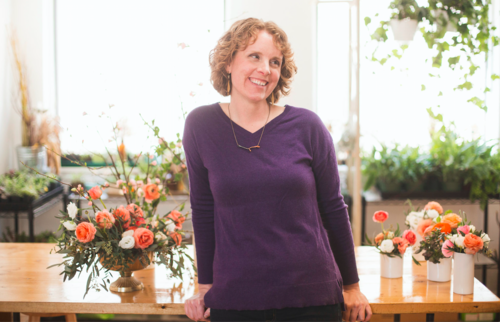
Our featured guest this week is florist-farmer Emily Watson, who first appeared on the Slow Flowers Podcast in 2015. I’m delighted that she has agreed to return and share an update on her business, Wood Violet, based in Milwaukee, Wisconsin. You’ll want to go back and listen to that earlier episode — click here.
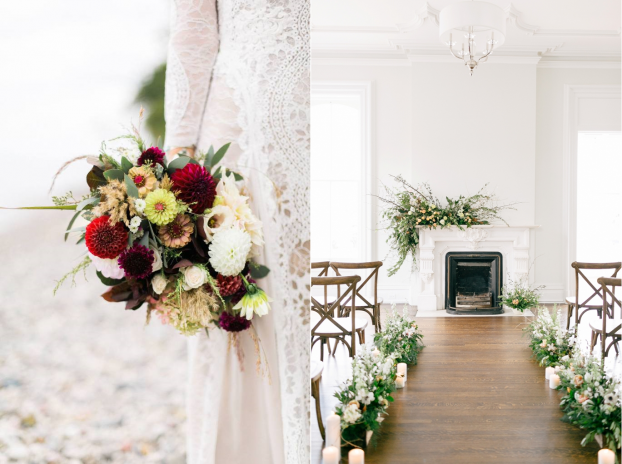
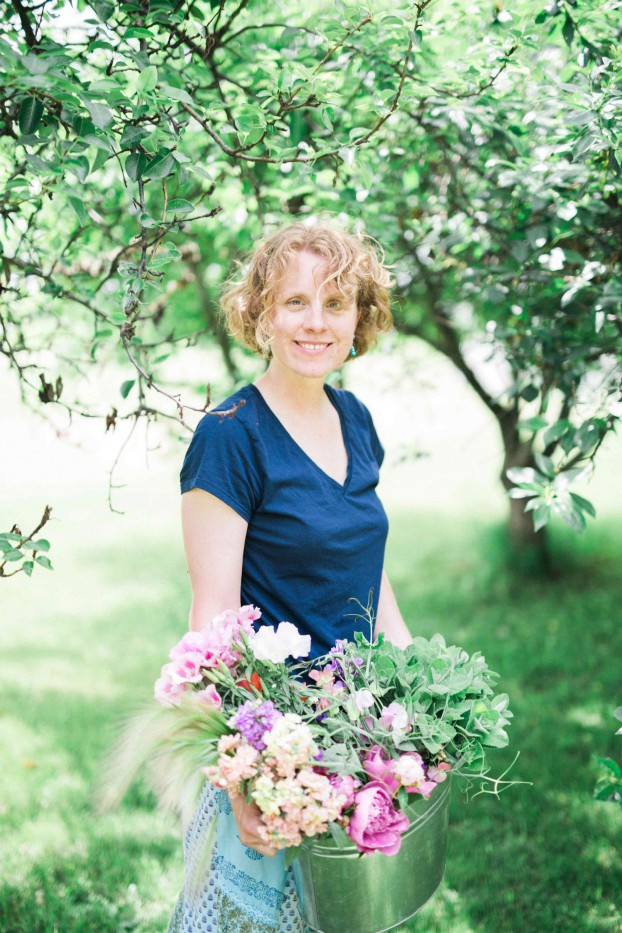
Five years ago when Emily joined me for an episode, the timing was auspicious. She was in the throes of pivoting from her small cut flower farm operation called Stems Cut Flowers to a wedding design studio named after Wisconsin’s state flower – the Wood Violet.
After five years focusing entirely on designing for couples and ceremonies, the land is calling Emily back. And she’s agreed to discuss her entrepreneurial thought process as her business is again responding to market opportunities.
Here’s a bit more about Emily, excerpted from her web site:
Emily is a farmer florist and small business owner who calls Milwaukee home. With an education in biological conservation and a background in both floral design and landscaping, she started Stems Cut Flowers in 2008.
With a little land borrowed from her grandparents’ farm in East Troy, Wisconsin, Emily envisioned that Stems Cut Flowers would sell to florists and at farmer’s markets, and maybe for an occasional wedding. Well the idea of occasional weddings turned into a nearly every weekend occurrence and it soon became evident that Emily was running two separate businesses. That’s when in 2015, she officially established two separate businesses and launched her floral design studio. Being that the wood violet is Wisconsin’s state flower it seemed an appropriate name for a business that is focused on using locally grown blooms. Stems Cut Flowers continued to grow and mostly supply flowers to the Wood Violet studio.
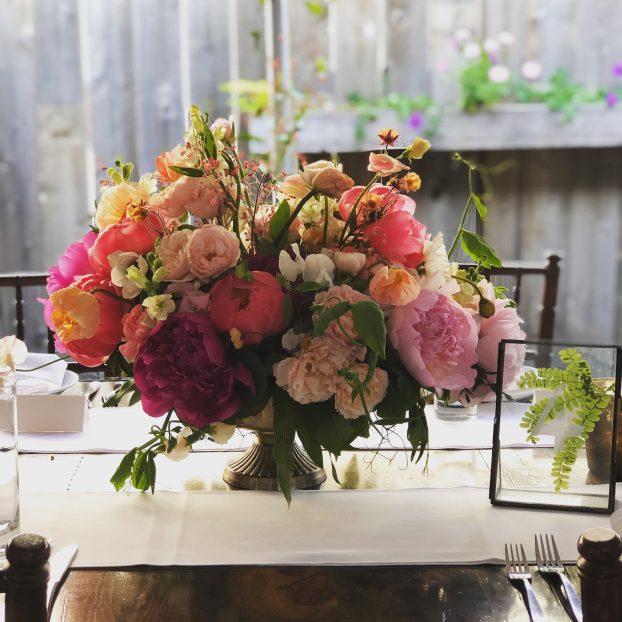
Find and follow Emily Watson at these social places:

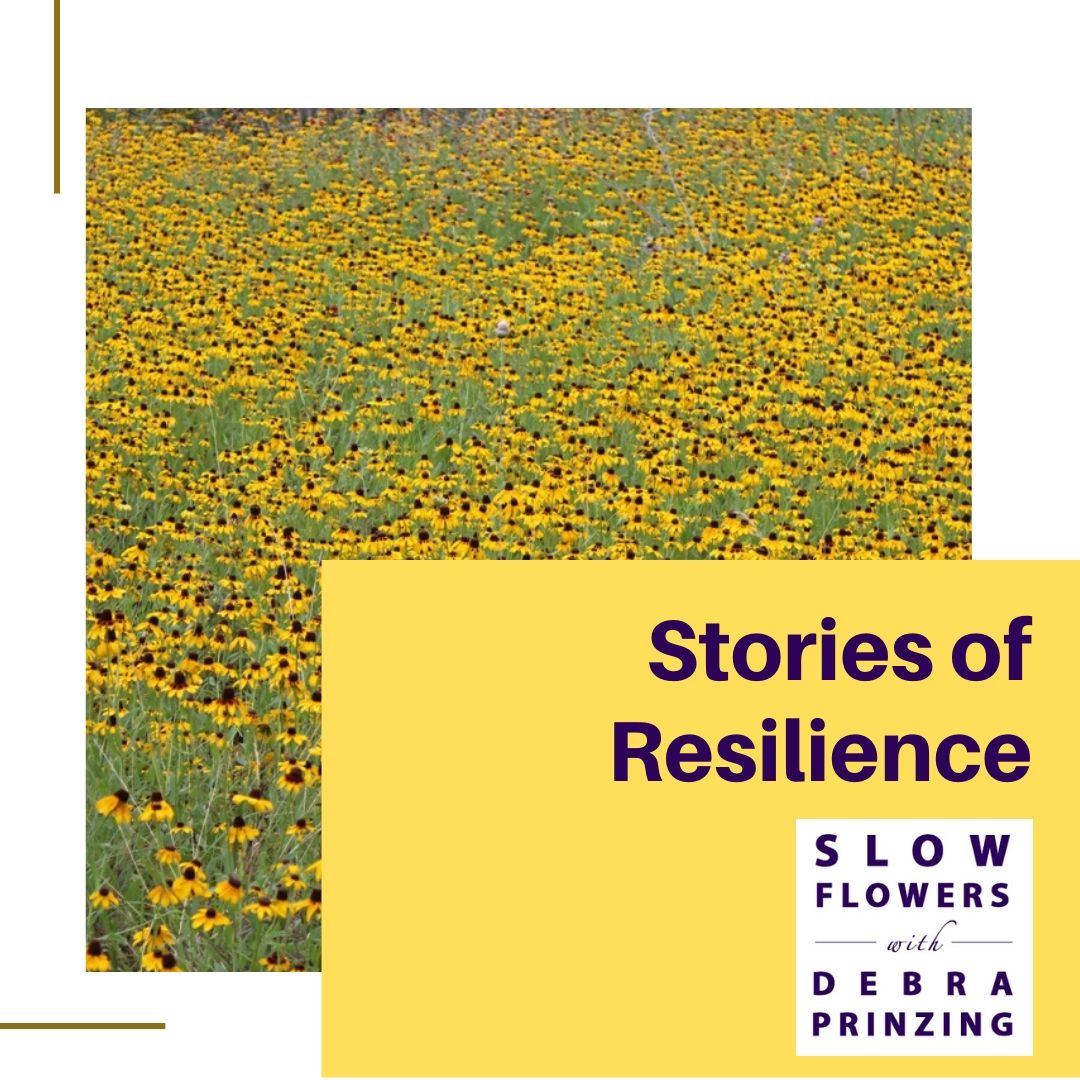 Our bonus series here on the Slow Flowers Podcast continues with our next installment of Stories of Resilience. I believe that now, more than ever, the message of sustainability and seasonal and locally-available flowers is top of mind — among consumers, flower farmers and florists.
Our bonus series here on the Slow Flowers Podcast continues with our next installment of Stories of Resilience. I believe that now, more than ever, the message of sustainability and seasonal and locally-available flowers is top of mind — among consumers, flower farmers and florists.
I want the Slow Flowers Podcast to be a companion to those of you in isolation, away from your physical community of peers, neighbors, customers and friends. I don’t have many answers, but I do want to keep the lines of communication open and accessible.
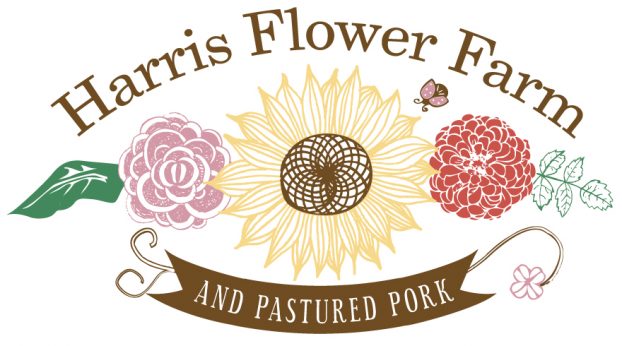
Today’s Stories of Resilience guest is Janis Harris of Harris Flower Farm in St. Thomas, Ontario, Canada. She is also Canada’s regional director for the Association of Specialty Cut Flower Growers.
I have been so intrigued by Janis’s posts on social media promoting local flowers to her community. For the past month, Harris Flower Farm has been marketing no-contact flowers thanks entirely to Janis’s creative efforts. It started on March 21st when she posted this message on Instagram: Fresh Locally Grown Spring Cheer-Up Bouquets; 3 Local Flower Farming Families are Coming Together to Bring You Some Cheer.
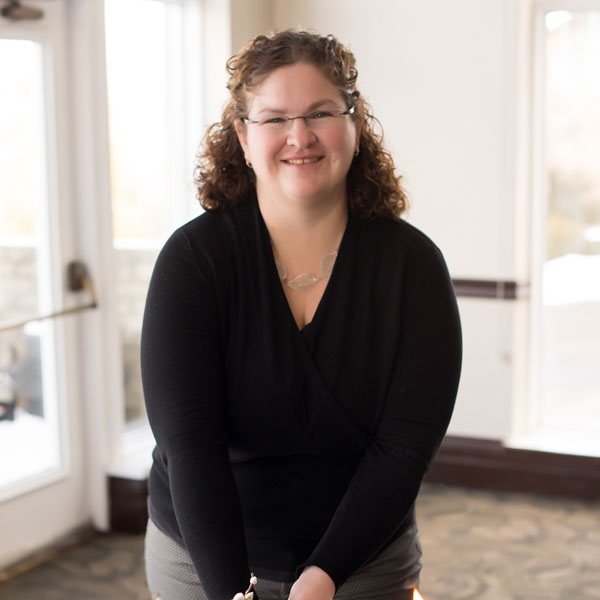
Janis directed buyers to visit the online shop on the Harris Flower Farm website to make their purchase of a $10 seasonal bouquet. Well, that project has blown up and taken over Janis’s life. More farms joined in so her marketing efforts are bringing additional revenue to fellow growers. Eager customers continue to order for the weekly bouquet deliveries, paying online and leaving a vase or bucket filled with water on their front porch.
Janis finds herself operating a floral business unlike anything she’s ever done before, delivering more than 100 bouquets in a single day and offering two days of delivery each week. Since the season is early and area farmers’ markets may or may not be able to open during Canada’s stay-at-home mandate, this project has clearly resonated with customers and flower lovers in her community.
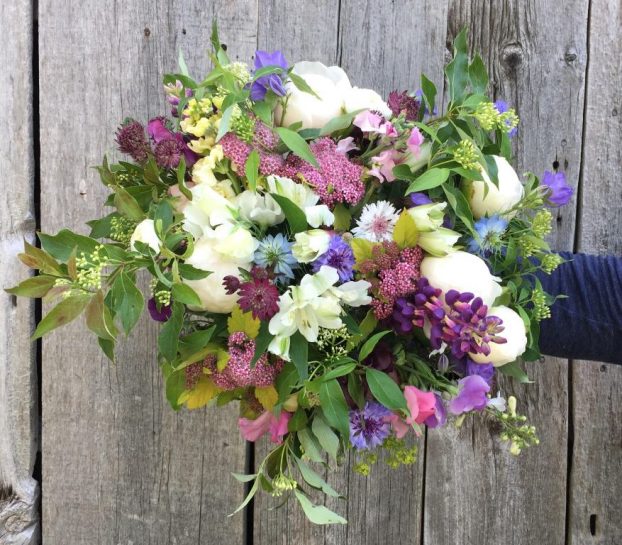
On March 24th, Janis posted this update on the Farm’s IG feed: This past week has been crazy humbling. But also figuring out our new norm of delivering flowers has been a learning curve. So I need to pause the deliveries for a bit so I can wrap my head around how we can proceed with delivering flowers. I also have to STILL BE A FLOWER FARMER. It is critical time for planting and seeding. We are sticking to our original seeding schedules. So there will be lots of flowers this summer. It’s still uncertain where and how we will sell them but I have to keep planting so there is a supply when we are on the other side of this.
To our 2020 couples: please keep us in the loop. We will work with whatever changes arise. Remember it’s your relationship that is important not the date, you still have each other.💕 I will continue to show you what is happening on the farm. Flower farming doesn’t stop. 🌻 stay healthy and positive.
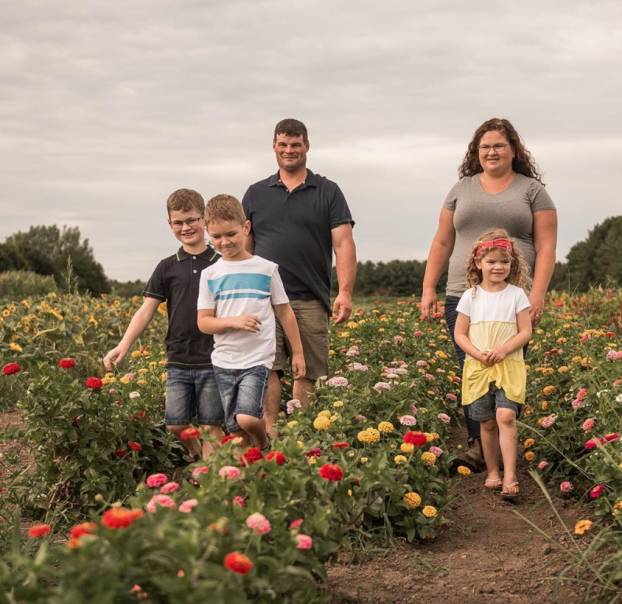
I’m so glad that Janis was able to share a moment of her time to record this Stories of Resilience segment for you. Best wishes to you, Janis and Mark! Listen to my 2017 Podcast interview with Janis and hear the full story of Harris Flower Farm.
Find and follow Harris Flower Farm at these social places:
Harris Flower Farm on Facebook
Harris Flower Farm on Instagram

Thanks so much for joining me today as we heard from both a flower farmer and a florist in our Slow Flowers community!
This past week, I was able to get out to my garden to start a bunch of flower seeds – some directly-sowed and some in flats in the greenhouse. Our nighttime temperatures here in Seattle are in the mid-40s right now, so I’m pretty confident that we’re past our last-frost date, but you never know! We have members who were hit with snow this past week, so nothing’s certain.
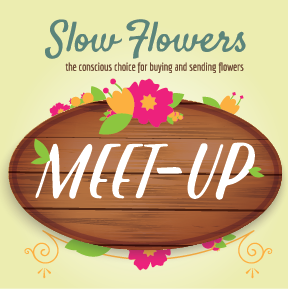
Our Slow Flowers Member Virtual Meet-Ups continue to have great attendance and participation and feel incredibly rewarding. After four consecutive weeks, I’m even feeling more confident about the Zoom technology. I owe a HUGE thanks to Karen Thornton of Avenue 22 Events, Niesha Blancas of Fetching Social Media and Lisa Waud of pot & box for their incredible talents to help make the Meet-Ups a smoothly run success. They’re part of the Slow Flowers Team that makes it all so joyful for me and keeps me sane.
Last Friday on April 17th, Teresa Sabankaya of Bonny Doon Garden Company joined us as a special guest – she shared about how she’s designing and selling flowers during the Coronavirus era. We also had a surprise special guest — you’ll have to watch the Zoom replay video of the Virtual Meeting to see who joined us. Click on the video link above to watch!
Please join the next Slow Flowers Virtual Meet-Up on Friday, April 24th at 9 am Pacific/Noon Eastern. Can’t wait to see you there! Our very special guest will be Julie Tobi, who is a life coach for creatives. I met Julie at Holly Chapple’s Flowerstock last fall and I was so impressed with how Julie views that elusive work-life balance and helps creative professionals lean into the fulfilling careers and lives they actually want to have.
Artist, writer and editor Lorene Edwards Forkner will also join us on April 24th — and she’ll share about her watercolor studies as a mindfulness practice. Follow this link to join the Zoom Meet-Up on Friday.

As I’ve mentioned earlier, plans for the fourth annual Slow Flowers Summit, scheduled for June 28-30 are still in place, but May 15th will be the date when we will make a definitive decision whether to move forward with the original conference dates or reschedule for later in the year. I want to make sure you have 45 days’ notice to adjust your plans if we have to postpone. And just in case, mark October 26-27 as the backup dates for gathering together at our beautiful venue, Filoli Historic House and Garden in Woodside, California. As I said last week: I’m as eager as you are to experience a fabulous conference that’s presented in a safe environment. I hope this plan assures you and assists you in managing your own schedule moving forward into 2020.
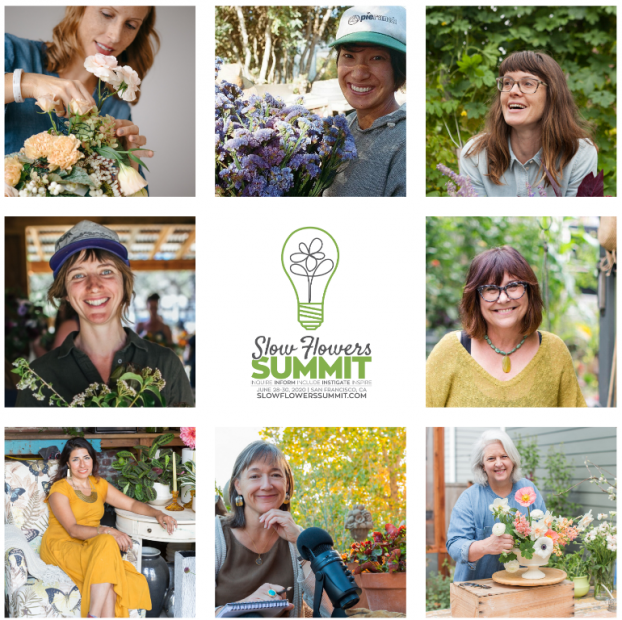
You can contact us anytime with questions and I’ve added links to my email and that of our event manager Karen Thornton in today’s show notes. You can also follow the Filoli VISIT Page and Slow Flowers Summit Page for additional updates. One more thing — this past week’s Summit newsletter features wonderful updates from all of our speakers, who shared what they’re doing and how they’re managing the COVID-19 shut-down. I’d love for you to read it, too, and you can find the link here.
Thank you to our Sponsors
This podcast is brought to you by Slowflowers.com, the free, nationwide online directory to florists, shops, and studios who design with American-grown flowers and to the farms that grow those blooms. It’s the conscious choice for buying and sending flowers.
And thank you to Florists’ Review magazine. I’m delighted to serve as Contributing Editor for Slow Flowers Journal, found in the pages of Florists’ Review. Read our stories at slowflowersjournal.com.
Johnny’s Selected Seeds, an employee-owned company that provides our industry the best flower, herb and vegetable seeds — supplied to farms large and small and even backyard cutting gardens like mine. Find the full catalog of flower seeds and bulbs at johnnysseeds.com.
Mayesh Wholesale Florist. Family-owned since 1978, Mayesh is the premier wedding and event supplier in the U.S. and we’re thrilled to partner with Mayesh to promote local and domestic flowers, which they source from farms large and small around the U.S. Learn more at mayesh.com.
The Gardener’s Workshop, which offers a full curriculum of online education for flower farmers and farmer-florists. Online education is more important this year than ever, and you’ll want to check out the course offerings at thegardenersworkshop.com.
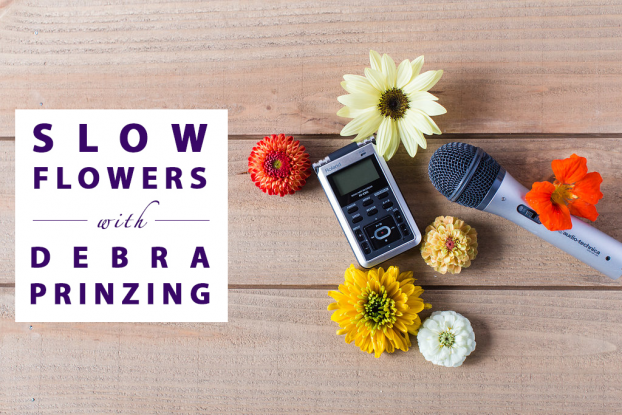
The Slow Flowers Podcast has been downloaded more than 599,000 times by listeners like you. Thank you for listening, commenting and sharing – it means so much.
As our movement gains more supporters and more passionate participants who believe in the importance of the American cut flower industry, the momentum is contagious. I know you feel it, too. I value your support and invite you to show your thanks and with a donation to support my ongoing advocacy, education and outreach activities. You can find the donate button in the column to the right.
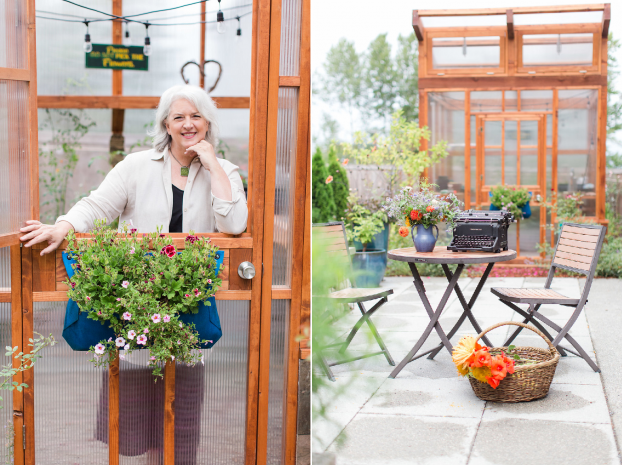
I’m Debra Prinzing, host and producer of the Slow Flowers Podcast. Next week, you’re invited to join me in putting more American grown flowers on the table, one vase at a time. And If you like what you hear, please consider logging onto iTunes and posting a listener review.
The content and opinions expressed here are either mine alone or those of my guests alone, independent of any podcast sponsor or other person, company or organization.
The Slow Flowers Podcast is engineered and edited by Andrew Brenlan. Learn more about his work at soundbodymovement.com.
Music Credits:
LaBranche; Heartland Flyer; Gaena; Glass Beads
by Blue Dot Sessions
http://www.sessions.blue
Lovely by Tryad
http://tryad.bandcamp.com/album/instrumentals
http://creativecommons.org/licenses/by-sa/3.0/
In The Field
audionautix.com








